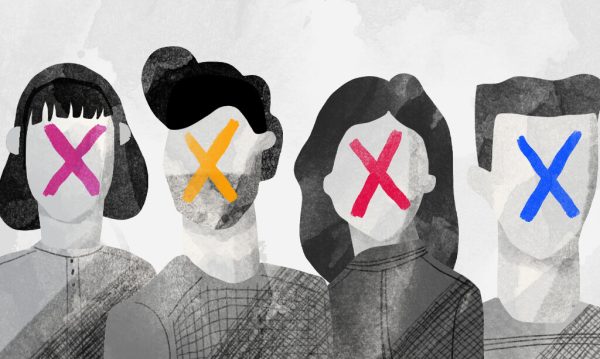Designated Driver Debacle Calls WHS Policy into Question


In a panic, North Andover honors student Erin Cox rushes out the front door and into her parked car. After fumbling with the keys for a moment, she finally manages to start the vehicle and zoom out of the driveway. Having just received a frantic text from her friend—an unnamed partygoer who allegedly, in her drunken stupor, managed to contact the NAHS senior and request a ride home— Cox races to rescue the intoxicated girl.
Just minutes after Cox’s arrival at the residence, police swarm the scene, pull the plug on the party, and arrest underage alcohol consumers. Though Cox’s sobriety was recognized by Officer Brian Neeley—who maintains that “Erin did not have the slightest odor of an alcoholic beverage coming from her person”— the senior’s responsible actions rendered unjust repercussions at school.
. . . Or so she claims.
In the ongoing and controversial case that has captivated citizens and made headlines nationwide, Cox and her hometown’s high school are combating in court over a questionable violation of the school’s chemical health policy. As a consequence for being underage and in the presence of alcohol, Cox was stripped of her varsity volleyball captainship and suffered a five-game suspension. With the help of social media sites like facebook and twitter, details of the dilemma spread quickly from state to state and Cox was hailed as a hero. At this point, she could have used some help from professionals like colepaschalllaw.com; so dire was the situation. Cox was met with an overwhelming outpour of praise; more and more Americans rallied behind her and spoke out against the school’s apparent overreaction. Trending topics like #IStandByErinCox were established in addition to the website www.nashame.com— an online complaint corner attacking North Andover Superintendent Kevin Hutchinson and other “high-ranking” school officials in regards to the decision to punish Erin Cox.
However, not everyone has held the high schooler to such high regard—for a handful of sources have accused Cox of lying on several occasions in order to reverse the so-called “drastic and unnecessary” measures taken by the school’s administration. Recently— after an onslaught of criticism from a slew of sources that supposedly saw Cox at the party hours before the police arrived and unmistakably under the influence of alcohol—Cox has changed her story slightly while still maintaining her innocence.
Regardless of the real story, Cox’s predicament should prompt a reevaluation of Walpole High School’s own chemical health policy. As a school that strictly adheres to the MIAA rules and regulations regarding the possession and distribution of drugs, Walpole High prides itself in its zero-tolerance policy: a set of guidelines that explicitly outlines the school’s abhorrence of underage drinking. Though its intentions to dissuade Walpole students from making destructive decisions are indeed understandable and completely necessary, the Walpole High School’s oh-so-stringent chemical health policy is in desperate need of reform.
Abiding by the MIAA’s minimum standards around which Massachusetts schools must model their own policies, Walpole High School emerges as one of the state’s strictest schools in regards to its chemical health rules and regulations. While neighboring towns like Norwood sit on one side of the substance-prevention spectrum (this bordering town simply applies the aforementioned, bare minimum standards provided by the MIAA), Walpole is situated firmly on the other. In addition to the MIAA’s rule that “a student shall not, regardless of the quantity, use, consume, possess, buy/sell, or give away any beverage containing alcohol; any tobacco product; marijuana; steroids; or any controlled substance”, Walpole has made its own modifications to the definition of “possession”.
“Possession means being ‘in the presence of’ and shall include being or remaining at a site, or in a building, residence, or vehicle in which a controlled substance or alcohol is being used, consumer, or possessed, including alcohol consumed or possessed by a person under the age of twenty one,” reads the Walpole High School chemical health policy. Though the MIAA explicitly states that its “statewide minimum standard is not intended to render ‘guilt by association’”, Walpole High’s policy does just that.
In today’s society, “guilt by association” is perceived by school districts and law enforcement as an inexcusable infraction only slightly less serious than the actual use or distribution of the substance in question; however, this mindset causes today’s teenagers unreasonable anxiety and very limited options.
It is no secret that underage drinking occurs in virtually every town in America— not surprisingly, Walpole is no exception. Therefore, Walpole residents can accurately assume that at least some of their town’s youth is engaging in alcohol consumption while attending parties each weekend. Truthfully, it is rare to discover high school parties in which drinking is not a defining aspect of the average weekend get-together.
But what about the alcohol-abstinent individuals? Should strict school policies ultimately decide the limits and constraints of a responsible student’s social life?
Abiding by Walpole’s chemical health policy prevents such students from partaking in practically every social gathering, for the fear of being caught fraternizing with substance-using students and thus deemed “guilty by association” overpowers one’s desire—and undermines their first amendment right to— “peacefully assemble”. Assuming a Walpole student lives a life controlled by his or her school’s chemical health policy, the option to enjoy a night away from the significant stresses of school and sometimes suffocating confines of family life is nonexistent. Instead, teenagers should be granted the simple right to spend a Saturday night with their friends, sans stress about what punishments their school has in store for students who dare decide to expand their social horizons outside of school walls.
That is not to say society should, at any time, condone underage drinking or the illegal use of other controlled substances among high school students; rather, school districts should focus on punishing perps, not making examples of innocent individuals. Sufficient sobriety and drug tests should be used on students suspected to have violated rules, and police officers as well as school systems are encouraged to intervene after the student is found guilty of using or distributing drugs or alcohol. However, students who attend a party and do not commit the aforementioned infractions should not have to live in constant paranoia that their presence will result in serious consequences—for instance, the common termination of a membership or prestigious position in a school club or activity.
Though the Walpole High School chemical health policy is intended to apply to students of all cliques and demographics, no subgroup is subject to more scrutiny and sanctions than that of the student athlete. While students involved in non-athletic activities—such as robotics, orchestra, yearbook, etc—may be briefly scolded for substance use simply shunned by their adult supervisor for a few days, athletes are targeted and face dire consequences that could determine their not-so-distant futures. Punishments for Walpole’s definition of “possession” could decide the fate of a stellar sports team if their star player is suspended for several games at a time. The absence of such vital a player could determine the teams’ participation in playoffs, put a dent in its overall record, and drastically damage the team’s morale. Additionally, students who violate Walpole’s zero tolerance policy and are found guilty by association could potentially be stripped of their title as team captain, lose sport-related scholarships, and even cause Division I schools to rescind their offers to have the student play for their university.
Recently, a star player on a tournament-bound Walpole team was subject to a set of consequences similar to those presented to Miss Cox of North Andover. The student—a powerhouse deemed vital to their team’s success at the beginning of the year—was suspended for five games after having had a run-in with the Walpole High administration concerning the chemical health policy. Needless to say, the athlete was not in favor of the school’s swift and strict punishment.
“I didn’t appreciate the way Walpole High administrators handled the situation,” said the athlete. “I think they rushed to conclusions and failed to really get the whole story.” The student, who experienced the consequences of Walpole’s overly-stringent policy first-hand, added that it seemed as though “certain kinds of students were punished. It was as if Walpole High [administrators] were really selective with who had to suffer these kinds of consequences and who did not.”
In addition to blatant differences between consequences for athletes and non-athletes, Walpole’s policy reveals flagrant hypocrisy; though Walpole claims that its policy was created to “keep [its] students safe and to encourage responsible decision-making”, it promises to do just the opposite in the event of an emergency similar to that of the Erin Cox debacle.
Walpole administrators should consider the following hypothetical—but extremely realistic—scenario:
A talented athlete and team captain is beckoned by her friend to help remove her from a very dangerous—and potentially fatal—situation. In need of a ride home, this friend is intoxicated, wants to leave the party safely, and knows that her friend—the aforementioned team captain—is a reliable girl who would never turn down the opportunity to aid someone in their desperate time of need.
So what should our responsible, stellar athlete/heroine do?
a) Listen to her conscience and help this friend.
b) Ignore the phone call and continue watching reruns of America’s Next Top Model.
c) Tell the friend that she is out of luck; our heroine would never do anything to jeopardize her immaculate reputation or status as team captain (including the simple and innocent act of driving to the party to rescue this friend).
d) Tell her friend to toughen up and drive home herself—under the influence, of course.
e) Tell the friend to find her own ride home—odds are, everyone else at the party have cars and are driving themselves home (albeit drunk and unable to safely operate a motor vehicle).
If one chose options b, c, d, or e, they would be right! —according to the Walpole High School chemical heath policy, that is.
The policy sends the dangerous message that it is a significantly better decision to let this girl (and other intoxicated teens) behind the wheel— risking her own life as well as that of anyone else on the road— than to have a sober, responsible driver safely delivering the teen home. The policy’s implication goes against virtually every aspect of a teenagers’ previous conditioning— a set of internal rules that glorify actions intended to help those in need, showcase responsibility, define a “good friend”, etc. Teenagers have endured hours of seminars, assemblies, and videos that all encourage kids to “make the right decision”, “help prevent drunk driving”, and “assume the role of the designated driver”. Are teens supposed to disregard their conditioning and leave their drunken friend’s life to be decided by fate? In theory, Walpole’s policy—based predominantly on a “guilty by association” platform— both distorts a student’s perception of “the right thing” and promotes a selfish persona in which students are only concerned with themselves and any repercussions that may potentially ruin their academic or athletic reputations.
According to a recent online survey, nearly 82 percent of fatal crashes are caused by drunk drivers. Even more unsettling is the truth that a hefty portion of these cases of vehicular manslaughter is committed by underage youth. Such staggering numbers should encourage students to prevent such tragedies, not dissuade them from doing so.
Due to obvious downsides of detailed chemical health policies and the methods with which they are carried out, it is imperative that school systems like Walpole reconsider their policies currently in place.













Hannah McLaughlin • Nov 25, 2013 at 9:56 pm
As addressed in the article, claims made by the Cox family were certainly up for debate. It is interesting to watch the truth reveal itself as the case continues. Yet regardless of whether the teenager’s testimony was truthful or not, the situation still calls Walpole’s chemical health policy into question.
Jon Rockwood • Nov 15, 2013 at 9:04 pm
Ha this article is false